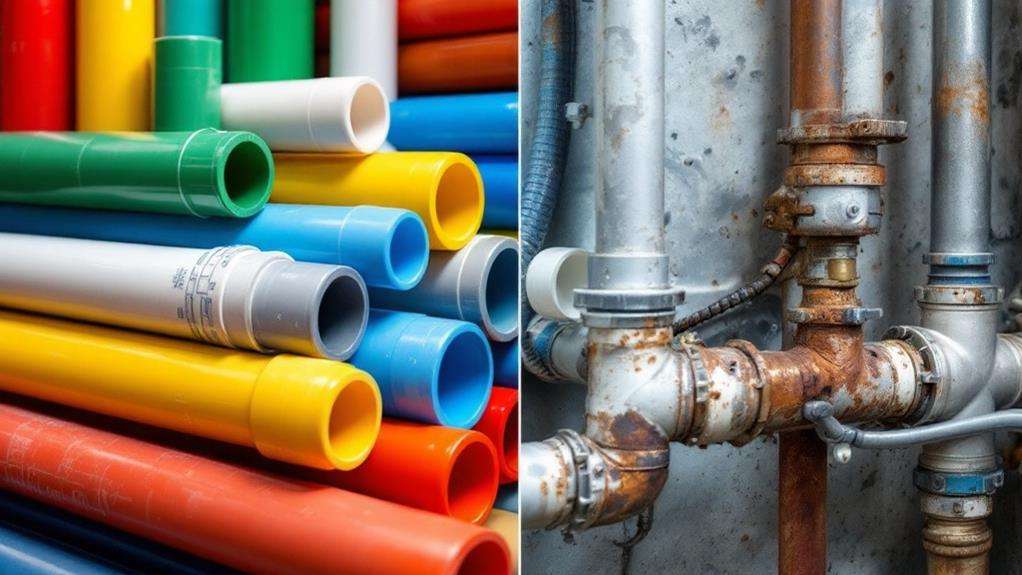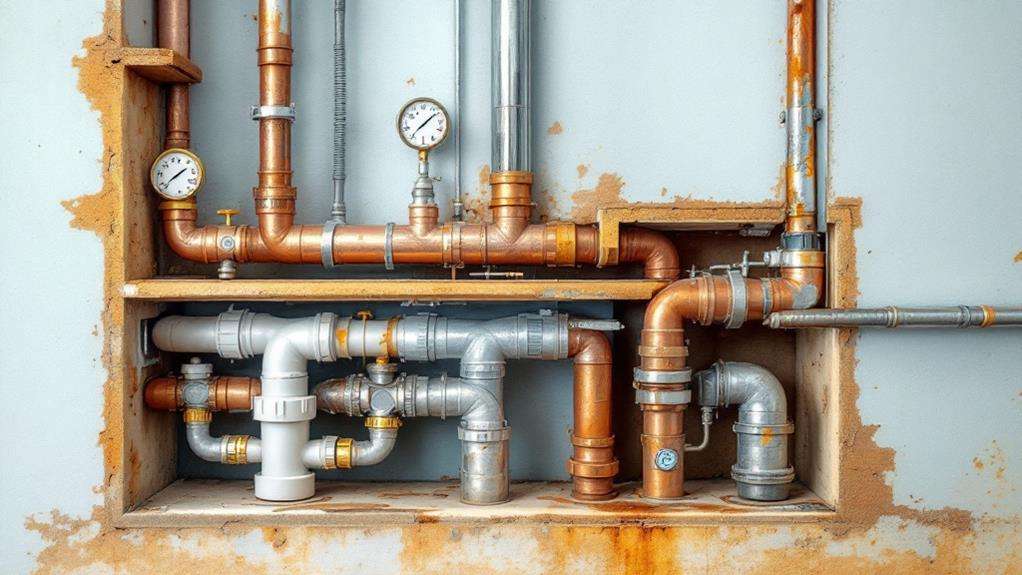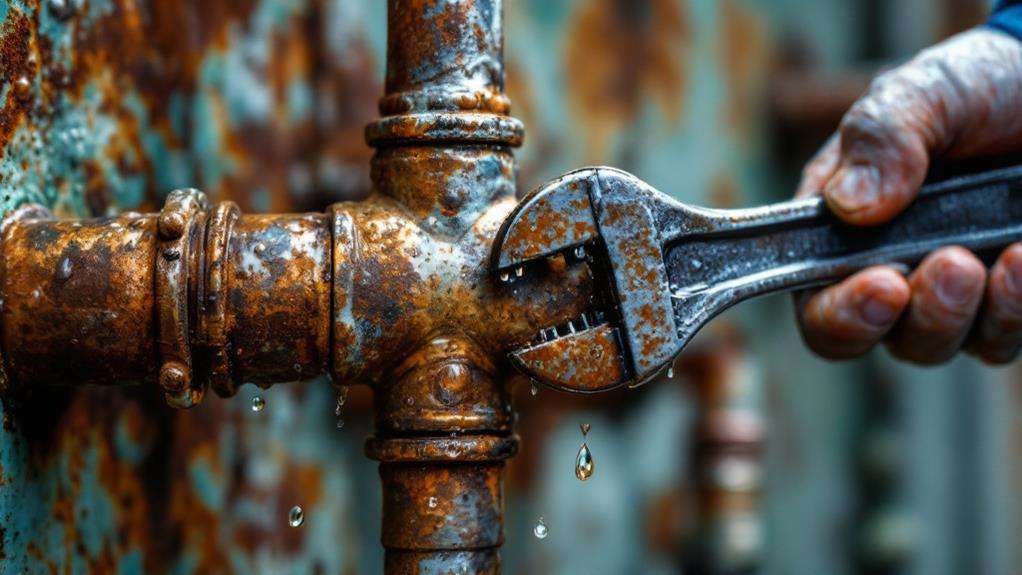Plumbing Pipe Lifespan: How Long Will Your Pipes Last?
Your home's plumbing pipes have varying lifespans depending on their material. Copper pipes typically last 50-70 years, while PVC can endure 50-100 years. Cast iron pipes often reach 80-100 years, and galvanized steel lasts 20-50 years. Factors like water quality, pressure, and maintenance affect longevity. Watch for signs of aging, such as discolored water, low pressure, or visible corrosion. While regular upkeep can extend pipe life, eventual replacement is inevitable. It's pivotal to be proactive rather than waiting for catastrophic failure. Understanding your pipes' materials and ages can help you plan for their future and avoid costly water damage.
Common Plumbing Pipe Materials
When it comes to plumbing, the choice of pipe material can substantially impact your home's longevity and maintenance needs. The most common materials used in residential plumbing systems include copper, PVC, galvanized steel, and cast iron pipes.
Copper pipes are a popular choice due to their impressive lifespan of 70 to 80 years and resistance to corrosion. They're a reliable option for homeowners looking for long-lasting plumbing solutions. Modern plastic alternatives like CPVC and PEX can also last more than 70 years, offering durability comparable to copper.
However, not all pipe materials are created equal. Polybutylene, a cheaper plastic option used from the 1970s to 90s, has a short lifespan of only 10-15 years and is no longer used in new installations. Galvanized steel pipes, common before the late 1960s, are prone to corrosion and may deteriorate in less than 50 years. Similarly, cast iron pipes, also prevalent before the 1960s, can deteriorate within 50 years due to corrosion.
Understanding the lifespan of different pipe materials can help you make informed decisions about your plumbing system's maintenance and potential upgrades, ensuring its longevity and efficiency.
Copper Pipes: Durability and Longevity
Renowned for their exceptional durability, copper pipes have become a staple in modern plumbing systems. If you live in a house built after 1970, there's a good chance your plumbing relies on these corrosion-resistant pipes. Copper pipes boast an impressive lifespan of 70 to 80 years, making them one of the most long-lasting options for your home's water infrastructure.
The secret to copper's longevity lies in its natural resistance to corrosion, which helps maintain the integrity of your plumbing system over time. However, it's pivotal to recognize that water quality can impact the lifespan of your copper pipes. Poor water quality may reduce their expected durability, potentially shortening their useful life.
As your copper pipes age, you might encounter the need for repairs. When this happens, it is essential to assess the overall condition of your plumbing system. Sometimes, a simple repair will suffice, but in other cases, replacement may be necessary. By staying vigilant and addressing issues promptly, you can maximize the lifespan of your copper pipes and guarantee your home's plumbing continues to function efficiently for decades to come.
Plastic Pipes: Modern Alternatives

While copper pipes have long been a popular choice, plastic pipes have emerged as formidable alternatives in modern plumbing systems. If you're living in a house built after 1970, chances are you have plastic pipes as the primary plumbing material. This shift towards plastic pipes has brought significant advantages with respect to durability and longevity.
PVC, CPVC, and PEX are the most common types of plastic pipes used in residential plumbing today. These materials offer impressive lifespans ranging from 45 to over 70 years, surpassing the durability of older metal pipes. CPVC and PEX pipes are particularly long-lasting, with potential lifespans exceeding 70 years. Even older PVC pipes can last around 45 years, making them a more durable option than their metal counterparts.
One of the key benefits of plastic pipes is their corrosion-resistant properties. Unlike metal pipes, which can deteriorate over time due to rust and mineral buildup, plastic pipes maintain their integrity for decades. This resistance to corrosion contributes to their extended lifespan and makes them an excellent choice for modern plumbing systems. By opting for plastic pipes, you're investing in a durable and long-lasting plumbing solution for your home.
Galvanized Steel and Cast Iron
Workhorses of the plumbing industry, galvanized steel and cast iron pipes have been fixtures in homes for decades. These materials were commonly used in plumbing systems prior to the 1960s, and many older homes still rely on them today. Both galvanized steel pipes and cast iron pipes boast an impressive lifespan of 80-100 years, making them durable choices for plumbing construction.
However, these pipes aren't without their drawbacks. Over time, they're prone to:
- Corrosion: The primary factor leading to deterioration
- Rust: Affecting both materials and reducing durability
- Potential replacement: Necessary for homes built before the 1960s
If you're living in an older home, it's important to be aware of your plumbing system's age and material. Galvanized steel and cast iron pipes may have served you well for decades, but they could be nearing the end of their useful life. As these pipes age, they become more susceptible to corrosion and rust, which can compromise water quality and structural integrity.
To maintain your plumbing system in optimal condition, consider having it inspected by a professional. They can assess the condition of your pipes and recommend replacements if necessary, helping you avoid potential issues down the line.
Factors Affecting Pipe Lifespan

The longevity of your home's plumbing pipes isn't determined by a single factor. Several variables influence their life expectancy, with pipe material being one of the most vital. Different materials, such as copper, PVC, or metal piping, have varying resistances to corrosion and wear.
Water quality plays a significant role in how long your pipes will last. Hard water or water with high mineral content can accelerate corrosion, causing pipes to corrode and rust more quickly. Some pipes have a protective coating to prevent corrosion, but this can wear away over time.
Water pressure is another essential factor. Constant pressure that's too high can stress your pipes, leading to leaks or bursts. Conversely, low pressure can cause sediment buildup, reducing pipe efficiency.
The age of your plumbing system also matters. If your home was built several decades ago, your pipes may be nearing the end of their lifespan. Regular maintenance of your water supply system can help extend pipe life. By understanding these factors, you can better predict and prepare for potential plumbing issues in your home.
Signs of Aging Plumbing
Vigilance is key when it comes to identifying signs of aging plumbing in your home. Whether you have copper piping, brass pipes, iron pipes, or steel piping, it's essential to recognize the indicators of deterioration. One of the most telling signs is discolored water. If you notice brown or dark hues coming from your taps, it's likely due to corrosion within your pipes. This isn't just an aesthetic issue; it's a serious problem that requires immediate attention from a professional plumber.
Another red flag is reduced water pressure or clogged pipes. Mineral deposits can build up over time, particularly in areas with hard water, leading to potential pipe bursts. Don't ignore these warning signs, as they can result in catastrophic damage to your plumbing system.
Visible rust or corrosion on exposed pipes, frequent leaks or water stains on walls and ceilings, and strange odors or tastes in your water are three key indicators of aging plumbing.
When to Replace Your Pipes

Knowing when to replace your pipes is essential for maintaining a healthy plumbing system. The age of your pipes is a pivotal factor in determining if it's time for replacement. If you're unsure when your pipes were last replaced, consider when your house was constructed. Pipes typically have different lifespans depending on the material used.
Brass, cast iron, and galvanized steel pipes in your home can last as long as 80-100 years. Copper pipes have an Average Lifespan of 70-80 years, while PVC pipes last around 50 years. However, these are just estimates, and your pipes may need replacement sooner or later depending on various factors.
Watch for signs that indicate it's time to replace your plumbing. Discolored water, low water pressure, and visible corrosion on exposed pipes are clear indicators. If you notice these issues, it's time to consult Plumbing Services for a professional assessment.
Remember that repiping is a major project requiring expert knowledge. While regular maintenance can extend your pipes' lifespan, eventually, they'll need replacement. Don't wait until a catastrophic failure occurs; proactive replacement can save you from costly water damage and inconvenience.
